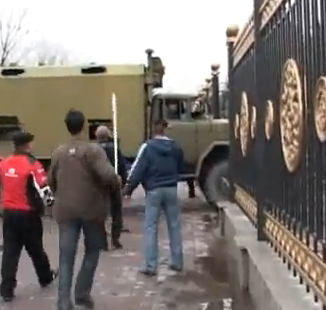Stories about War & Conflict from April, 2010
Sudan: Peace prospects brighten dreams
Nina writes about peace and hope in South Sudan: “But because I live here and see examples of courage and strength every day also, I know there is hope. Even though last year more people died in South Sudan than in Darfur, peace is now taking hold for the first...
16 Years Later, the Rwandan Genocide Remembered
On April 7th, Rwanda commemorated the 16th anniversary of the genocide that took the lives of as many as 800,000 people and traumatized a whole region to this day. The genocide is commemorated to keep the memory of the victims alive and honor them but also to help the country move forward in the spirit of unity and reconciliation.
Russia: Bloggers Discuss Andrzej Wajda's “Katyń” Movie
For the first time in Russian history, Andrzej Wajda's “Katyń” (2007) has been aired on Russian public television channel “Kultura” -- thus leading to online discussions on Stalin regime, historical truth, humanism and Russian-Poland relations.
Kyrgyzstan: Social Media Create and Fight Information Overload
The coverage of recent bloody events in Kyrgyzstan by online and traditional media caused information overload that made it very difficult to create a consistent picture. That is why bloggers who focused on monitoring the information, checking its credibility and creating consistent picture of events, played an important role in an adequate coverage of the protests.
Kyrgyzstan: The “Archived” Revolution
On April 6th, Kyrgyzstan was hit by mass protests which eventually led to the overthrow of the government as well as many deaths. While the internet did not play a major role in mobilizing the protests, it has been used to document what happened in detail.
Nepal: Remembering The April Uprising
“When people arise, all power will have to surrender!” Ujjwal Acharya at The Radiant Star remembers the mass peoples’ movement in Nepal during April 2006, which ended monarchy and Maoists’ People’s War establishing a more reformed democracy in the country.
Colombia: ‘Child Bomb’ Used to Attack Police Station
Gustavo Silva Cano provides his thoughts [es] about the death of 12-year-old Heriberto Grueso in El Charco (Nariño, southwestern Colombia), killed by a bomb he was carrying inside a package that an unknown person asked him to deliver apparently to the little town's police station.
India: The Naxalites Continue
“The reason why Naxalites have been able to sustain their insurgency for so long is due to three main reasons: the absence or failure of governance; the romanticism and propaganda of their overground sympathisers; and, finally, due to the relatively subliminal nature of their violence,” comments The Acorn while discussing...
Russia: War Reporter Blogs on Trauma and Politics of the Subway Attacks
Olga Allenova is a special correspondent for the Kommersant daily, author of Chechnya is Close: War Through the Eyes of a Woman, a collection of the 1999-2007 war reportage from the North Caucasus. In the post below, she writes about the March 29 subway bombings, the subsequent pain and trauma, and the resulting political and media responses.
Lebanon: Dissemination of Information in the Arab World
“In 1991, the Arabs were terrified of Western supremacy in technology (smart bombs for example that CNN kept showing their devastating effects in collateral damages on civilians)… In 2003, Arab/Moslem masses had Al Jazeera channel to cover the war among 32 other satellite channels…This information victory scared the Western civilization…”...
D.R. of Congo: Five misconceptions about Congo conflict
Jason discusses five misconceptions about the conflict in the D.R. of Congo: “1. The conflict in the DRC is all about minerals. Not quite. The war began in 1996, with three main causes: the collapse of the Zairian state after 32 years of misrule; the spillover from the Rwandan genocide...
Russia: Reflections on the Subway Bombings and Politics
It's been a week since the March 29 Moscow subway bombings, which killed 40 people and left over 100 injured. Below is a sampling from an ongoing discussion by Russophone bloggers.
Afghanistan: Some Tricky Numbers
Joshua Foust analyzes the latest freshly released numbers about opium seizures in Afghanistan.
Lebanon: Police Round-Up Israeli Spies
Marco Villa writes at InstaBlogs about the not so publicized and recent arrests, by the Lebanese police, of about 25 Israeli spy rings that were operating within Lebanon.
Russia: Subway Bombings Rap
LJ user abstract2001 posts audio and lyrics (RUS) of Dino MC 47's new rap song about the March 29 Moscow subway attacks. A YouTube video is here (via LJ user oleg-kozyrev).
Russia: Mainstream and Citizen Media Coverage
Lengthy discussions of the mainstream and citizen media coverage of the March 29 Moscow subway attacks: Minding Russia – here and here, FPA's Russia blog – here and here, and Global Voices Online – here.
Russia: Anglophone Commentary on Subway Attacks
More Anglophone discussions of the March 29 Moscow subway bombings, the politics around it and the commentary it has generated: Sean's Russia Blog – here and here; FPA's Russia blog; A Good Treaty – here and here; Dzutsev's Weblog; DI's Russia Blog; A Step At A Time – here, here...
Russia: “Moscow Calm – Before the Storm”
At GlobalPost, Miriam Elder reports from Moscow on the March 29 subway attacks: “It's this lack of information that helps breed the conspiracy theories that are so rife. In the U.S., we're used to nonstop programming when the slightest (or largest) thing goes wrong. Here, state-run television ran its regular...
Russia: “Technology Failed Many”
Svetlana Gladkova of Profy writes about her failed attempts to locate a Moscow friend via various popular communication tools following the March 29 subway attacks: “In this tightly interconnected world we all depend a lot on communication tools like cell phones, email, IMs, and social networks and when such tools...
Russia: “A Perfect Target”
Irina Filatova writes at the Guardian's Comment is Free that the tough measures and increased xenophobia that are likely to follow the March 29 Moscow subway bombings will not “make Moscow underground safer.”
Russia: “March Elegy”
Anna Akhmatova's poem and some memories of the Moscow subway and the Park Kultury station where the second of the two March 29 blasts occurred – at Poemless: “In the Metro, you could buy a puppy and take the puppy to the vet, have its prescriptions filled, buy some lingerie...




